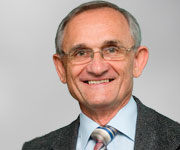Treating disease has become so good and so specialised in the last half century that the wishes of the person with the disease and their experience of the illness journey are often overlooked or given a lower priority than the disease from which they are suffering.
Emeritus Professor Eric Cassell from New York, whose distinguished career in medicine and public health included almost 40 years as a physician, has constantly reminded us that palliative care is personal — it is about a person.
Palliative care has three primary objectives.
The first is life. Not just quality of life in the academic research sense, but in the sense of the lived experience of the person. Not as we see it, but as they choose it.
The second is to minimise suffering. Again, this means suffering as the person experiences it, which should be considered in the context of their body, mind and spirit.
The third is to consider the journey of the person’s family and other fellow life travellers. Bereavement is better when the first two objectives have been met, and when it has been planned for throughout the course of the disease.
The other major contribution of palliative care is that it is delivered by multidisciplinary teams. Multidisciplinary team care is born of humility — an understanding that no one of us can provide adequate end-of-life care alone, and that such care requires a wide variety of skills.
There is nothing about palliative care that is incompatible with the active treatment of disease. In recent times we are starting to see that the coexistence of active treatment and palliative care is producing better outcomes for patients in terms of both quality and length of life.
A recent article by US palliative care physician, Diane Meier outlines a case in point where the treating physician was concerned that opioid use in an elderly patient would exacerbate her delirium. In reality when, with help from the palliative care team, her pain was controlled with morphine, the delirium resolved.
Another article in the same issue of JAMA outlines two options for treatment of a 46-year-old man with lung cancer and alludes to the benefits of palliative care involvement.
In both of these cases, collaboration between active treatment and palliative care was the best option. This is not new in Australia, where we are seeing increasing collaboration of this kind happening, but there is need for more.
Having palliative care teams in all of our hospitals is achievable and is a goal that should be set. Having community palliative care services available to all is an equally important goal.
People being treated for serious diseases should have access to palliative care services.
Collaboration between treating and palliative teams is fundamental to achieving this goal.
The principles and practice of palliative care should be part of the education and training of all clinicians to bring better care to people who are sick, and to lead to better, more timely, referral to palliative care services. Expanding training opportunities for all the disciplines involved in palliative care makes sense, as the demand is clearly about to increase significantly.
Educating the public is also important and should be led by better-educated clinicians. Clinicians often underestimate how much the public take their lead in understanding end-of-life matters. While ever clinicians retreat from and deny the inevitability of death, so will our society.
It is not a failure when a person in our care dies. It is a failure when they have not had the chance to maximise their life experience, when they have suffered unnecessarily, and when due consideration has not been given to the bereavement of their loved ones.
Dr Scott Blackwell is a general practitioner and is president of Palliative Care Australia
Posted 13 August 2012

 more_vert
more_vert
I am very surprised there was no reference to the use of self-medication with opioids up to a daily maximim topped up each day as neccessary developed br Dr. Pollard at Concord Hospital, resulting in lower consumption of opioid, and a more conscious, co-operative and happy patient.